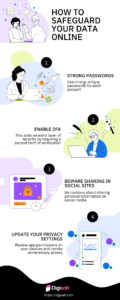In today’s digital age, our lives are becoming increasingly intertwined with technology. From online banking and shopping to social media and personal communication, we rely on the internet for almost every aspect of our daily lives. However, with this increased reliance on technology comes the risk of cyber threats and attacks.
Cybersecurity has become a crucial aspect of our digital lives, as it is essential to protect our personal information and sensitive data from falling into the wrong hands.
Staying Ahead of the Game: Proactive Measures
To stay ahead of the game and protect against these threats, it is essential to take proactive measures. Here are some key steps that individuals and organizations can take to ensure cybersecurity in an ever-evolving digital landscape:
1. Educate Yourself and Your Team: The first step towards ensuring cybersecurity is to educate yourself and your team about the potential threats and how to prevent them. This includes understanding the different types of cyber attacks, how they can occur, and the warning signs to look out for. Regular training and awareness programs can help keep everyone informed and vigilant.
2. Keep Software and Systems Up to Date: One of the most common ways cybercriminals gain access to systems is through outdated software and systems. It is crucial to regularly update all software and systems, including operating systems, web browsers, and antivirus software. These updates often include security patches that address known vulnerabilities.
3. Implement Strong Password Policies: Weak passwords are a significant vulnerability that cybercriminals can exploit. It is essential to implement strong password policies, such as using a combination of letters, numbers, and special characters, and changing passwords regularly. Additionally, consider using multi-factor authentication for an extra layer of security.
4. Backup Data Regularly: Data loss can occur due to cyber attacks, system failures, or human error. Regularly backing up data is crucial to ensure that it can be recovered in case of any such incidents. It is recommended to have multiple backups, including offsite and cloud backups, to ensure data is not lost in case of a physical disaster.
5. Use Encryption: Encryption is the process of converting data into a code to prevent unauthorized access. It is essential to use encryption for sensitive data, such as financial information, personal data, and confidential business information. This ensures that even if the data is compromised, it cannot be accessed without the encryption key.
6. Monitor Network Activity: Monitoring network activity can help detect any suspicious or unauthorized activity. This includes monitoring for unusual login attempts, data transfers, and network traffic. Regularly reviewing logs and implementing intrusion detection systems can help identify potential threats and take action before they cause any harm.
7. Have a Response Plan in Place: Despite taking all necessary precautions, cyber attacks can still occur. It is crucial to have a response plan in place to minimize the impact of such incidents. This includes having a designated team to handle the response, having backups in place, and having a communication plan to inform stakeholders.

Cybersecurity is crucial in today’s digital age, where our personal and professional lives are heavily reliant on technology. With the rise of cyber threats, it is essential to take necessary precautions to keep our digital life safe. This includes using strong passwords, regularly updating software, and being cautious of suspicious emails or links.
By implementing these measures, you can safeguard yourself against potential cyber threats and enjoy a worry-free online experience.

